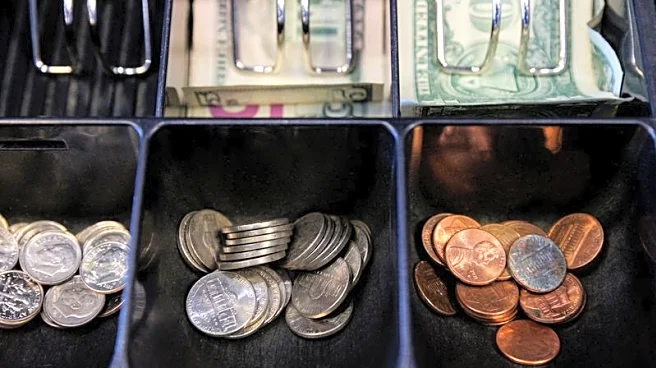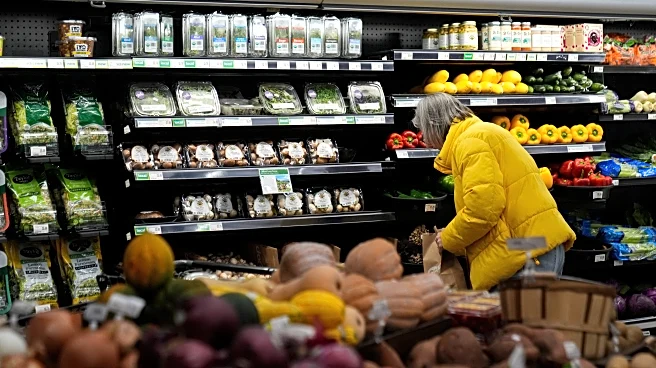By Jarrett Renshaw
(Reuters) -Now that the United States no longer makes pennies, there is a scramble among gas stations, fast-food chains and big-box stores to adjust prices and round cash transactions,
and it could potentially eat into their profits.
Pennies are drying up faster than retailers anticipated following President Donald Trump's decision earlier this year to halt production of the one-cent coin. Retail groups recently told Reuters that they are frustrated by the lack of guidance from the Trump administration and lawmakers, forcing them to round down to avoid angering customers and violating laws in some states — potentially costing high-volume businesses significant money.
The National Retail Federation said the dearth of pennies has hit retailers in urban and rural areas, with no clear geographic pattern. Members of some state restaurant associations have voiced concerns about penny shortages.
“Any merchant that accepts cash is grappling with this,” said Dylan Jeon, senior director of government relations with the National Retail Federation, whose members include Walmart, Target, Macy’s, and Old Navy.
Some major convenience chains have already begun warning customers.
Sheetz, a family-owned convenience store, posted signs at one of its Pennsylvania stores that read: “The U.S. Mint will no longer produce pennies, so we are short on change!” The signs encourage customers to use cashless payment options, round up purchases to support charity, or exchange $1 in spare pennies for a free self-serve drink.
Kwik Trip, the convenience store chain based in La Crosse, Wisconsin, announced that its 850 stores across the Midwest would round cash transactions down to the nearest nickel. At a Dallas location, a sign warns customers: "The US Treasury has stopped making pennies and we may experience shortages."
Kroger, one of the largest U.S. grocery chains, told Reuters it is still assessing the impact of the penny shortage. Many of its 2,700 locations have displayed signs asking customers for exact change.
Individual stores with other large chains have done the same, such as a CVS in Alexandria, Virginia, that posted a notice asking for exact change because of a "penny shortage."
Treasury did not respond to multiple requests for comment.
Several countries, including Canada, Australia, Ireland and New Zealand, have phased out their lowest-value coins, rounding cash transactions up or down to the nearest five cents while keeping electronic payments exact. The moves cut minting costs and simplified cash handling for retailers.
In the U.S., phasing out pennies would require similar rounding practices at stores, adjustments to registers, and clear communication to consumers, but could deliver comparable savings and efficiency gains.
Several states, including California, New York and Illinois, however, have consumer protection laws that require retailers to provide exact change on cash transactions, creating legal uncertainty as pennies disappear from circulation. Retail groups say those rules make it difficult to adjust prices or round totals without risking fines or customer complaints.
LOOKING FOR CONSISTENT RULES
While Trump’s directive initiated the end to production, Congress retains authority over coinage, meaning legislation may still be required for a permanent discontinuation. The NRF has been lobbying the Trump administration and Congress to provide consistent guidance, particularly around rounding transactions.
“What’s most helpful in the near term is clarity on rounding practices — whether retailers can round up or down on transaction totals or change,” Jeon said.
A group of trade organizations that include gas stations, convenience stores, travel centers and grocery stores warned in a September 30 letter to congressional leaders that "if these remedies are not addressed in short order, it will be challenging to legally engage in cash transactions with customers in growing swaths of the country."
Love’s Travel Stops, which operates more than 640 locations in 42 states, said the phaseout of penny production is affecting its retail operations.
“If one of our stores runs out of pennies, all change on cash transactions will be adjusted in the favor of the customer and Love’s will cover the difference,” a company spokesperson said. “This is a temporary measure while we work toward a long-term solution."
Months after Trump ordered a halt to production of pennies, the Treasury Department in May placed its final order for blank penny planchets. Several Federal Reserve Bank sites, which distribute coins to banks and credit unions, have already stopped fulfilling orders for pennies.
Producing a penny currently costs more than its face value — about 3.69 cents per coin in recent years. The government now projects savings of roughly $56 million annually by ending penny minting.
There are about 114 billion pennies currently in circulation in the United States, but they are greatly underutilized, the Treasury says. The penny was one of the first coins made by the U.S. Mint after its establishment in 1792.
Supporters of the penny argue it helps keep consumer prices down and is a source of income to charities. For its critics, the coin is a nuisance that ends up being discarded in drawers, ashtrays and piggy banks.
"I can't even tell you the last time I carried pennies — even loose change — when I left the house," said Pennsylvania resident Sandy Berger, 45. "I really don't think people will care to see them gone."
(Reporting By Jarrett Renshaw; Editing by Sergio Non and Diane Craft)












